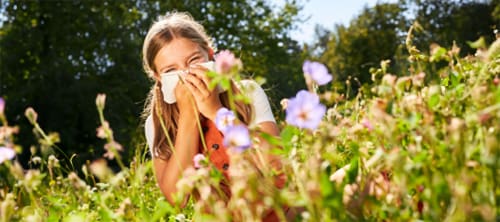Hay fever is caused by the nose and/or eyes coming into contact with environmental allergens, such as pollens (grasses, weeds or trees), dust mites, moulds and animal dander. Most people associate hay fever with spring when airborne grass pollens are at their peak.
Trees and plants produce more pollen between May and July, which is the usual growth season. This, together with warmer, more humid weather and breezes, might cause an increase in our symptoms.
Recent unseasonably mild winters, warm springs, and dry summers have caused plants to grow more vigorously and enjoy a longer, more effective growing season. As a result, hay fever sufferers can suffer anytime between early spring and late autumn.
In England, about 10 million individuals of all ages suffer from hay fever. This translates to nearly one in four adults and one in ten kids, and research indicates that the number of sufferers is increasing year after year.
What are the most common symptoms?
- sneezing and coughing
- a runny or blocked nose
- itchy, red or watery eyes
- itchy throat, mouth, nose and ears
- loss of smell
- pain around your temples and forehead
- headache
- earache
- feeling tired
If you have asthma, you might also:
- have a tight feeling in your chest
- be short of breath
- wheeze and cough
Hay fever will last for weeks or months, unlike a cold, which usually goes away after 1 to 2 weeks.
How to treat hay fever?
Hay fever may make the summer months painful if it is not treated. Therefore, it’s crucial to prepare and follow a few easy safety precautions on days when the pollen count is expected to be especially high. While there are many kinds of over the counter and prescription hay fever treatments, they essentially fall into two main categories: defence and relief.
Defence: When you experience symptoms of hay fever for the first time, preventative therapies are intended to help. One typical example is antihistamine pills. These operate by preventing the action of histamines, as the name implies, which can make your hay fever symptoms worse. However, it’s worth remembering that some older antihistamines may cause drowsiness. Allergen barrier nasal sprays and nasal gels function directly in the nose and begin working within a few minutes, in contrast to pills, which can take up to an hour to become effective. These therapies efficiently protect the nose, the body’s principal entry point for allergens, by preventing them from penetrating the nasal canal.
Relief: The severity of the symptoms increases with the length of exposure to the allergen. As a result, in the later phases of hay fever, the aim is to manage and reduce the symptoms so that you can resume your daily activities. Antihistamines may help to lessen sneezing or a runny nose, but they are less effective at treating congestion. However, corticosteroid nasal sprays can assist to treat a variety of various symptoms, such as runny nose, swollen sinuses, and sneezing, as well as nasal lining inflammation and itchy, red eyes.
How to minimise the symptoms
There’s currently no cure for hay fever and you cannot prevent it.
But you can do things to ease your symptoms when the pollen count is high.
- remove outdoor clothing and shower or wash your hair following high pollen exposure
- close windows at night
- vacuum regularly
- avoid keeping flowers in the house.
- avoid drying washing outside when the pollen count is high or when cutting the grass, as this can bring pollen into the house.
- avoid walking in grassy, open spaces, particularly during the early morning and early evening
- keep an eye on the weather forecast for information about pollen count levels and avoid going outdoors when the pollen count is Medium or High
- install pollen filters in your car if they are not already fitted
- drive with windows closed
- consider wearing wrap-around sunglasses to stop pollen getting in your eyes when outdoors
Treatments for hay fever from a GP
Your doctor may advise steroid therapy, such as steroid nasal spray.
Your doctor could recommend immunotherapy if steroids and other hay fever treatments do not relieve your symptoms.
In order to gradually increase your resistance to pollen, you will be given a small amount of pollen as an injection or tablet.
Three months prior to the start of the hay fever season, this type of treatment typically begins in the winter.
It’s possible that not all areas have access to immunotherapy because it’s a specialised service.
We hope this information helps and gives you lots of advice if you or someone you know suffers from hay fever.
If you would like to speak to us about how we could help with your First Aid training requirements, please call us on 01276 586943 or email us at admin@crosscountiestraining.co.uk for hassle-free bookings.
